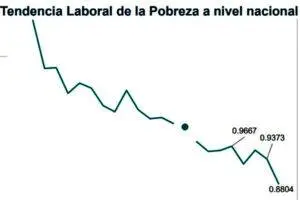By Kurt Hackbarth
— Claudia Sheinbaum won Mexico’s presidential election thanks to her party’s record of passing universal social policies, respecting working-class voters, and rejecting biased media narratives.
On Sunday, June 2, former Mexico City mayor Claudia Sheinbaum won a resounding victory to become the first woman president in Mexican history. The thirty-two-point drubbing of her conservative opponent, Xóchitl Gálvez — the second landslide in a row for the barely decade-old Morena (National Regeneration Movement) party — was even larger than the one that swept Andrés Manuel López Obrador (AMLO) to power in 2018. Outstripping final poll averages by some ten to fifteen points, Sheinbaum won from north to south, in urban and rural areas alike, and in every state but one. Crucially, the MORENA coalition also reached the supermajority threshold of two-thirds in the Chamber of Deputies and came close enough in the Senate that it will be able to pass constitutional amendments virtually on its own, without the need to negotiate with the opposition.
A closer look at exit poll results reveals how the victory was constructed. Sheinbaum won 56 percent of women and 62 percent of men, belying the “machismo” label so beloved by the foreign press and the correspondents who swooped into the country in the days before the election in search of easy sound bites. She won across age ranges, income strata, and educational levels, carrying those with no schooling or elementary education by large margins but also the college educated by seven points. Similarly, she did not only win a thumping 71 percent of voters in the lowest socioeconomic strata — indicative of the class realignment that has taken place over the last six years — but also beat out Gálvez among the upper-middle class, 49 percent to 41 percent. Sheinbaum prevailed across trades and professions, losing only those who identified as “owners,” and even won a sizable plurality (42 percent) of those who consider themselves to be on the Right.
How did the MORENA coalition not only equal but build on its 2018 victory? Let’s break it down.
Worker-Friendly Legislation
Wielding its congressional majorities, MORENA in government passed a raft of worker-friendly legislation over its first term. This included increased employer contributions to the AFORE system of individual retirement accounts, union reform providing for secret-ballot elections and the mandatory renegotiating of contracts, an outsourcing law prohibiting companies from contracting out their core functions and increasing the formula paid in profit sharing, disability benefits, and a doubling of vacation days and the minimum wage. Although many of these reforms started from a low bar and were insufficient on their own, they showed momentum in the right direction.
Among the new set of constitutional reforms AMLO wants to pass before leaving office is a further pension reform allowing workers to retire with 100 percent of their last salary up to the average salary of formal-sector employees. Meanwhile, boosted by the knock-on effect of minimum-wage increases, wages for salaried workers are outpacing inflation by 32.6 percent.
Not Throwing the Poor Under the Bus
Unlike the US Democrats, who have exorcised the poor from their rhetoric since the 1980s, AMLO never distanced himself from the slogan of his first presidential campaign: Por el bien de todos, primero los pobres (“For the good of all, the poor come first”). In policy terms, this took the form of a universal senior pension, stay-in-school scholarships for public-school students, benefits for working mothers, farm supports and a tree planning and husbandry program, and road-building works using local labor and materials in poor states such as Oaxaca, among others. Avoiding the means-testing trap advocated by elite policy centers, key programs such as the pension were made universal and locked in at the constitutional level. In the depths of the pandemic, when the international financial press was excoriating AMLO for not indebting the country to subsidize business payrolls, these programs provided a lifeline for the half of the country that works in the informal sector and would not have been reached by said subsidies.
Sheinbaum won 56 percent of women and 62 percent of men, belying the ‘machismo’ label so beloved by the foreign press.
The strategy worked: according to the National Council for the Evaluation of Social Development Policy (CONEVAL), some 5.1 million Mexicans were lifted out of poverty from 2018 to 2022.
The Mañanera Against the Media Scrum
Refusing to be kneecapped by the same national and international press that attempted multiple times to put a premature end to his career, AMLO instituted what was soon to become the set piece of his administration: his morning press conference, known as the mañanera. Equal parts information session, debate club, history lesson, and stand-up routine, the two-to-three-hour daily sessions provided the president with the opportunity to go over the heads of the corporate media, set the agenda, and turn his batting back of a never-ending series of attacks into popular entertainment. Over time, the mañaneras became a social-media phenomenon, with the president hitting the top ten of Spanish-language streamers, beating out YouTubers a third of his age with massive platforms of their own.
And although a gaggle of ancien régime pundits attempted to tar the sessions as attacks on the free press, the president’s daily sparring with the oligarch-aligned fourth estate penetrated into political consciousness at every level of Mexican society. One need only recall the viral photo of an elderly man in Sonora watching the mañanera from an internet café to grasp how important of a communication vehicle the sessions had become.
Reappropriating “Anti-Corruption”
Another building block of MORENA’s victory came at the level of discourse. Whereas in country after country the Right has hijacked the discourses of “values,” “anti-corruption,” and “patriotism,” AMLO deftly found the way to turn all of them on his opponents. First, he focused on the need to live within one’s means, both on a personal and governmental level, in order to prioritize those less well-off. The “pharaonic” state he inherited, in which a golden caste of agency heads, top-level bureaucrats, and judges showered themselves with eye-popping salaries and benefits, gave him endless opportunities to go to war against excess under the battle cry, “There cannot be a rich government with a poor people.”
The second, infused with the fervor of the first, took the form of a crusade against the corruption that, in conjunction with the mass privatizations of the neoliberal era, hollowed out the state from within, making it easy prey for the infiltration of drug cartels while creating a class of nouveau riche multimillionaires. Finally, with his regional accent, love of colorful phrases, endless tours of the country, and extolling of the nation’s history, culture, and cuisine, AMLO could portray himself as the quintessential Mexican, in contrast to an opposition all too willing to run off to Washington at the slightest pretense in a desperate attempt to provoke Uncle Sam into intervening at its bidding.
Maintaining Party Unity
As MORENA faced its first competitive presidential candidate selection in 2024, the youthful party underwent a major test that a number of pundits predicted would end badly. Mindful of the internal election process that tore apart MORENA’s predecessor, the Party of the Democratic Revolution, the party adopted, on AMLO’s urging, a candidate selection process based on opinion polling instead of primary voting. MORENA thus designed a system of five national polls, one conducted by the party and the four others by firms chosen by the different candidates; in all of them Sheinbaum won by an average of 13.5 percent. This did not stop her main rival, former foreign secretary Marcelo Ebrard, from crying foul and nearly bolting the party. The force of gravity within both party and movement, however, together with Sheinbaum’s presence and diplomatic skills, was enough to force Ebrard to return to the fold, and he has been named secretary of economy in the president-elect’s cabinet.
The organizational discipline of the MORENA campaign contrasted favorably with that of Gálvez, who lurched from proposal to proposal and insult to insult.
Selection by polling is clearly a fudge and by no means constitutes a long-term solution for MORENA, which was criticized in a series of downballot races, moreover, for applying it with a lack of transparency. But in a context where Mexico has scant experience in organizing primaries, it spared a youthful party from an acrimonious process, either internal or external, for which it was arguably not ready.
Embracing Continuity With AMLO
Despite concerns that she was not “charismatic” enough to sustain a presidential candidacy, Claudia Sheinbaum played to her strengths, running a tight-ship campaign that combined a staggered rollout of policy proposals with a heavy travel schedule. The organizational discipline of the campaign contrasted favorably with that of Gálvez, who lurched from proposal to proposal and insult to insult with seemingly no rudder or bearings. In the debates, Sheinbaum faced off attacks with a combination poker face and ability to deflect back to her own line of argument.
And faced with calls to distance herself from AMLO and prove that she was “her own person,” she refused to take the bait, explaining repeatedly that she represents a movement and that her administration will be dedicated to building a segundo piso, or second floor, on top of the first (in a similar fashion, she has repeatedly declared that she will not be attaining the presidency as an individual woman, but that all Mexican women will be arriving with her). With a majority of voters now expressing confidence in the federal government — up from barely a quarter in 2017 — the continuity strategy was clearly the right read on the situation.
Blackmail, Inc.
In the days following the election, the usual media suspects attempted to play the panic card for all they were worth. If voters had so resoundingly rejected their yearslong narrative by exercising their democratic prerogative, then the undemocratic, unelected, and unaccountable financial markets were going to have to step in and correct their excesses. “Mexico’s Leftists Won Big. Investors are Worried,” screeched the New York Times, adding menacingly that the peso had had its worst week since the pandemic. “Is Mexico’s democracy dying?” worried Fareed Zakaria on CNN. “It really is a testament that Mexico’s democratic system is reversing into a single, dominant hegemonic party,” the Wilson Center’s Lila Abed warned in Politico. “Why is this important to the United States? Because if Mexico doesn’t have a democracy, forget about security cooperation, forget about nearshoring, because companies are not going to want to invest in a country where there’s no separation of powers, where there’s not an independent, autonomous judicial branch, where there’s no clear rules of the game.”
But the old tricks just don’t seem to work like they used to. After some brief postelectoral jitters, stocks calmed, the peso began gaining ground again, and the media narrative moved on. For now. Once the Sheinbaum administration’s battles begin — on energy sovereignty, on migration, on banning GMO corn and glyphosate, on reforming the judicial system — the sensationalist headlines will be back. As they showed on June 2, however, Mexican voters are singularly unconcerned.
Source: https://jacobin.com/2024/07/claudia-sheinbaum-amlo-morena-mexico










